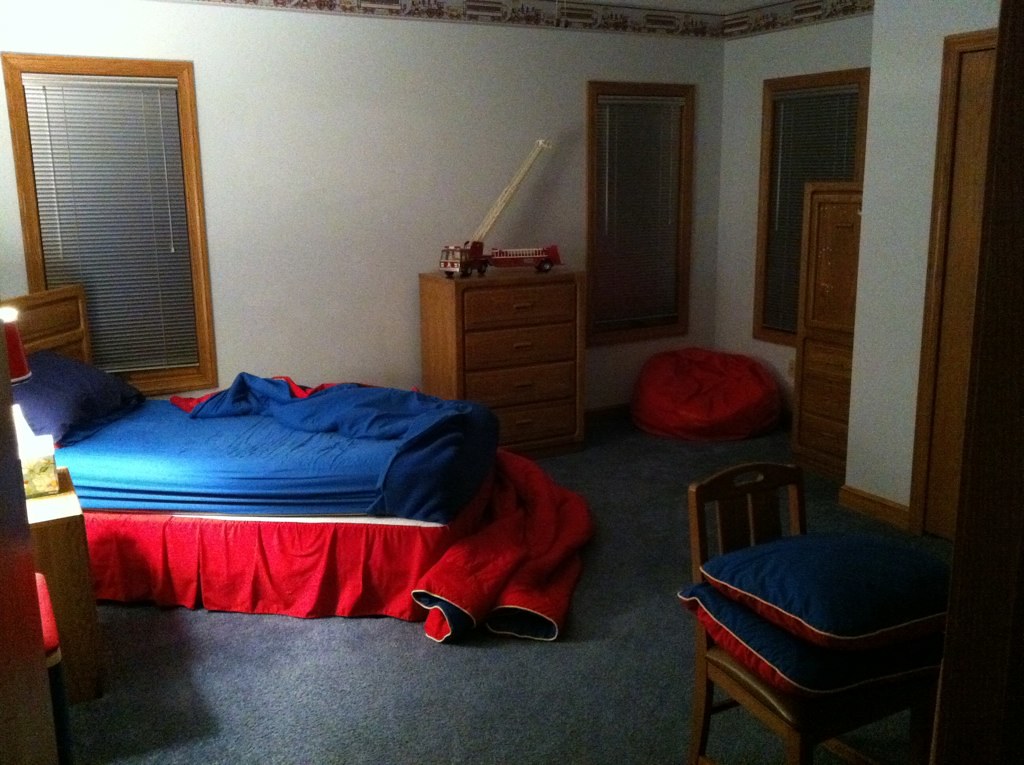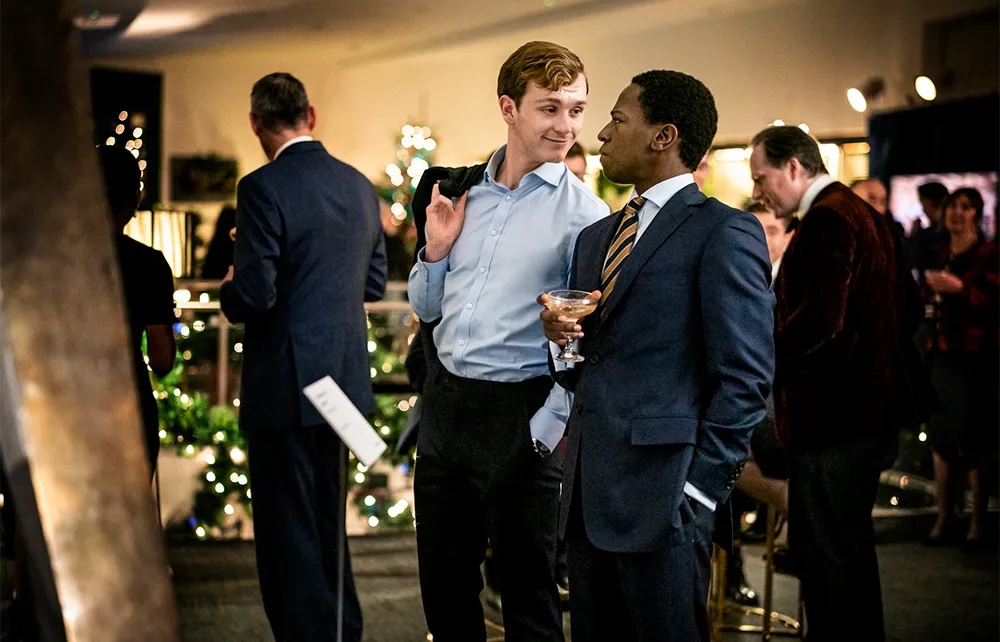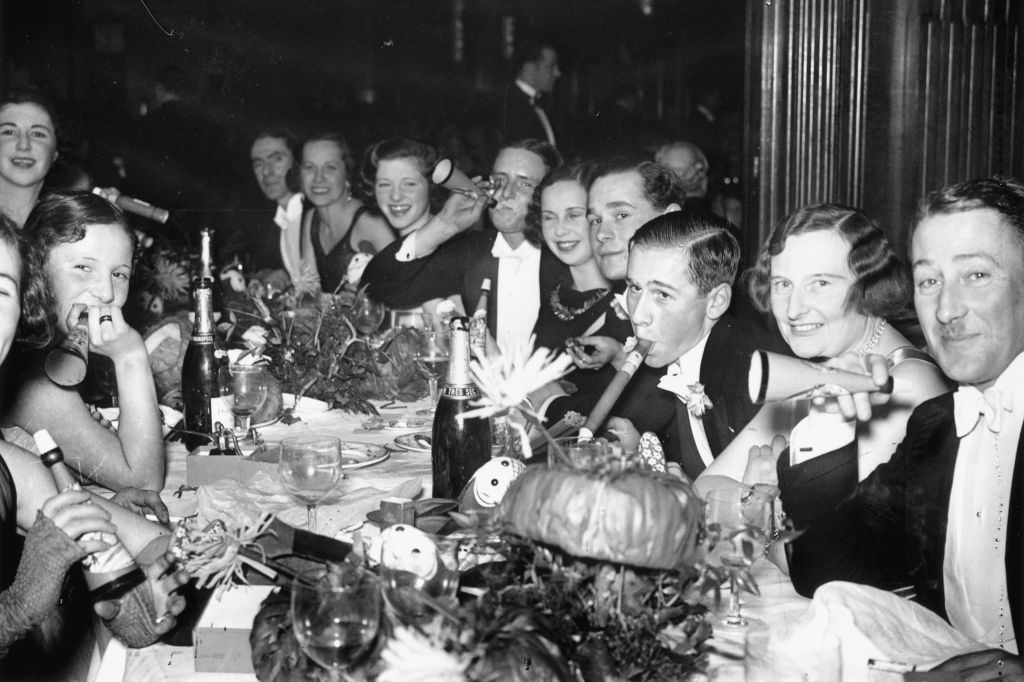One day during a recent visit to my parents in Hunterdon County, New Jersey, my best friend and I met up and went on a daytrip. We drove around Edison’s Oak Tree Road corridor to the east, a heavily Indian neighborhood in a suburban sprawl setting. It’s a really interesting place, but the highlight of the day was probably going over to my friend’s house later that evening.
We grew up together — we were fellow homeschoolers in our church group — and I know his house as well as the one I grew up in. I’ve written before about how thankful I am to have grown up in one house, in one place, as my friend did. But I guess we kind of grew up in two houses, because we knew each others’ so well. Both of them are thick with memories.
After a couple of late-night hours in the backyard pool, still warm from the day’s heat — and a visit from a few raccoons who live in the woods behind the yard — we headed back inside. We poked around upstairs. The house contains a family history. They ended up with exactly as many children as they had bedrooms (not counting the master). My friend was the youngest of three children, and he started with the smallest bedroom; his oldest sister had the largest one. When she moved out, he took her big bedroom, and now she uses his old one when she visits. His other sister, the middle child, kept her original room. She also uses it occasionally. Once, when we were kids, we played tug-of-war with her door, my friend and I on one side and his sister and one of her best friends on the other; we almost split the door in two.
We took a peek in her closet to see if a quirky old board game we used to play when we were ten was still in there. It was. So was her Fisher Price tape recorder. That board game was probably put away for the last time when I was over there as a kid.
Over in my friend’s room, most of the old belongings and decorations were gone, because he lives in an apartment now. But the L-shaped desk that started in his first room is still there; we used to hide under it during sleepovers. Later on, he wrote all sorts of things on the underside about his high school girlfriend (good things!), and there was even a note about a girl I was interested in back in 2010. Then he pulled out a black CD case, zipped it open, and showed me the old collection of PC games, which used to sit above the family computer downstairs in the living room. (Having the computer in a public spot is one thing I particularly miss about the ’90s.)
Now his nieces play many of those same games. Others, like the Army Men game we snuck out to play during a very boring movie night years and years ago, are just bits of nostalgia now. One of them used to be installed on his first laptop, back when they came with CD-ROM drives.
I felt so young, and so old.
None of these details of a long friendship probably mean much to you. I don’t even know how much they mean to me. If you gave me the choice, I’d freeze that house in time, so my friend and I could always go back and relive our shared childhoods. I love seeing things that haven’t been touched in ages. Yet if all that stuff were gone, or even if his family moved, I’d get over it soon enough. If nobody told me it was gone, I probably wouldn’t notice.
My feelings here remind me of NIMBYism — for “not in my backyard,” or the tendency of people to oppose, sometimes in a knee-jerk way, almost any new projects, from incinerators (maybe we should oppose them) to new housing (maybe we shouldn’t).
If you give people the chance to complain, they will. If you give them the chance to turn their preferences into policy, they will. If you don’t? Most of them will be fine. I think of my own attachment to things like my friend’s house as a more innocent manifestation of NIMBYism. Once I wrote about my own parents’ house:
I was in the kitchen and I noticed a little tile that was propped up against the backsplash, resting on a windowsill in front of the sink. Next to it was a little wooden turtle with a bobbing head, a souvenir from a vacation to California back in the early 2000s. They kind of clutter up the windowsill — perhaps they should have been moved years ago. But they hadn’t been, and I could remember those exact trinkets in their exact positions, back when I was a little kid.
The “natural NIMBY” in me would keep them there forever, sheer time having imbued something ordinary and meaningless with a comforting sense of stability and permanence. And yet, if they were gone on my next visit, I probably wouldn’t care. It’s interesting how invested we can get in things that really don’t even mean that much to us.
The lesson I take from this is that we fear change more than is rational, but also that change with continuity is optimal. In other words, I’d be upset if my friend’s house were torn down.
But more about feeling old — or maybe the right term is “grown up.” After the bedroom tour, we went down to the basement. It was the same scene as any number of nights twenty years ago: standing around chatting, playing in the nooks and crannies, looking at the video game collection that used to be new and is now old-school. (How can something transform into a retro collectible just sitting there, like it always has?)
But instead of hoping the parents will open another bottle of wine, or say “time to go,” call us upstairs, and then stand around in the foyer so long that we can slip back downstairs, the parents are already asleep; they retired before 10 p.m. Neither of us has kids yet, but we’re effectively the parents now. We had done the same thing they used to do: we got to the foyer, said our tentative goodbyes, and then I just wanted to take a peek in the basement. Presto, another hour.
Twenty years ago it might have been potty talk. Ten, maybe it was girls. Now we shot the breeze about generators, sump pumps, dehumidifiers, and the price of gas. I still feel a little self-conscious talking about “adult” concerns. Your twenties are an uncanny and beautiful time, when you make that subtle, almost imperceptible shift from a college student whose “home” is still your parents’ to a full adult in your own right.
But this feeling helps me to to see the continuity; instead of feeling like I’m losing my freedom or my childhood, I settle into adulthood with the understanding that I’m reenacting my childhood from the other side. I’m taking the mantle from my parents, inheriting the routines they taught me, doing the errands in the driver’s seat instead of the backseat. When you conflate adulthood purely with individual autonomy, there’s a lot that you miss, and miss out on. Seeing life as a cycle, rather than a lonely linear journey, is deeply comforting.
I’ve been an adult for a while now (I’ve been married for five years), but I still have these moments where I appreciate anew what that means. I suppose at some point — maybe the impending thirty-year mark — you stop remembering that you’re an adult and just start being one. But for now, I’m happy to keep getting those little reminders.

























